The ketogenic diet is a high-fat, low-carb diet that’s great for sustainable weight loss, more energy, and better overall health.
But the keto diet requires that you keep your carbs at a minimum, which begs the question: Can you drink alcohol on the keto diet?
The short answer is yes! There are plenty of keto-friendly drinks that will keep you in ketosis. But it’s the type and quantity of your alcohol that matters.
Read on to find out the drinks that might kick you out of ketosis (say goodbye to your sugary margarita) and which may have little to no effect on your goals.
Keto-Friendly Alcohol
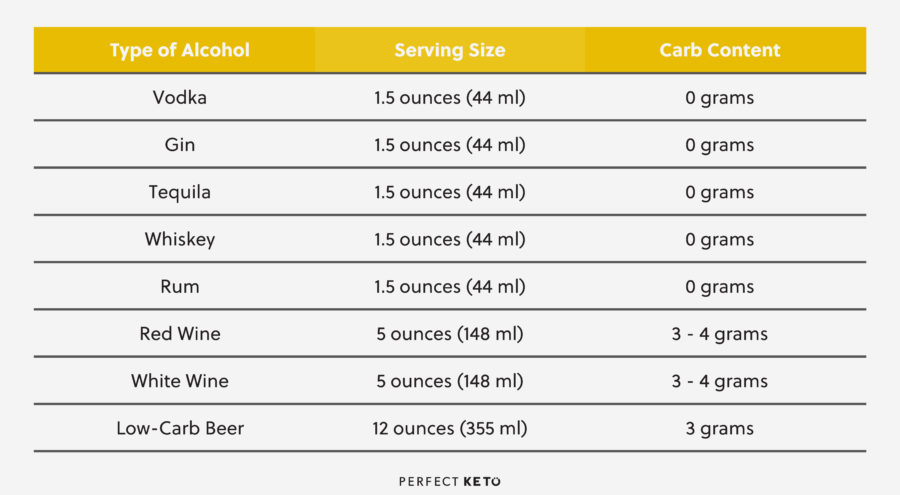
There are plenty of low-carb alcohol options you can have on a keto diet. as a general rule, pure distilled alcohol is the best keto option, as it contains zero carbs.
Dry wines and champagnes/sparkling wines are also strong choices, although most of them do have some carbs.
Here’s a look at each category of keto alcohol.
Distilled alcohol
A shot of these unflavored hard liquors contains zero carbs:
- Vodka
- Gin
- Whiskey
- Scotch
- Tequila
Rum and brandy can be tricky, especially if you have quite a few drinks in a night. While most options don’t have any carbs, certain rums and brandies are flavored or distilled with sweeteners/spices, and can set you back 0.5 g to 3 g of carbs per serving (or per shot).
Sip on these hard liquors on their own, or combine them with the keto cocktail mixers listed below.
Wine and Champagne
There are several keto-friendly wine and champagne options. The key is to choose dry wines — wines that have very little sugar left after fermentation and are therefore low in carbs. For sparkling wine or champagne, dry wines are labeled “brut.”
Dry red wines include cabernet sauvignon, pinot noir, and merlot. They generally run between 3 grams and 4 grams of carbs[*].
Dry white wines include pinot blanc, pinot grigio, and sauvignon blanc. They typically range anywhere from 2.5 grams to 3.5 grams of carbs per glass[*].
A flute of brut champagne clocks in under 3 grams of carbs and brut sparkling wine normally contains less than 2 grams of carbs. “Brut Nature” is the driest type of sparkling wine/champagne, with under a single gram of carbs per five-ounce serving.
Beer
At 13 grams of carbs per serving, the average beer is difficult to fit into a keto diet[*]. However, there are low-carb beers on the market that you can absolutely drink on keto.
Light beers such as Michelob Ultra, Rolling Rock Green Light, and Miller Light only have around 3 grams of carbs.
Low-carb beer like Budweiser Select 55 and Miller 64 have under 2.5 grams of carbs per bottle.
If you want a gluten-free option, Omission Ultimate Light has 5 grams of carbs per bottle.
Low-Carb Hard Seltzers
Grocery stores and liquor shop shelves have been bursting with new low-carb options in hard seltzer, or alcoholic sparkling water.
Companies including Henry’s, White Claw, Truly, and more are putting out cans of spiked seltzer containing natural flavors and a bit of sugar to create portable, bubbly cocktails you can enjoy anywhere.
Though they’re lower in carbs (between 2 grams and 6 grams of carbs per can), they’re also lower in alcohol content at 4% to 6% ABV (alcohol by volume).
Carb content differs between brands and flavors, check the nutrition facts to make sure you’re not loading up on too much sugar or artificial sweetener.
Low-Carb Mixers for a Keto Diet
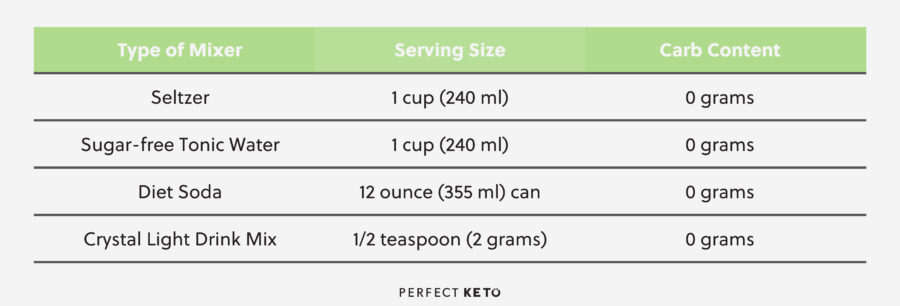
When it comes to keto mixed drinks, you want to be sure you’re choosing a low-carb mixer as well as low-carb alcohol. While vodka has zero net carbs, pairing it with sugary lemonade, fruit juice, soda, or tonic water creates a drink that will knock you out of ketosis.
It’s simplest to choose alcoholic drinks without mixers, but you can absolutely make keto mixed drinks.
Combine your favorite hard liquor with a splash of lemon or lime juice and a carbonated, sugar-free mixer for the ultimate zero-carb cocktail.
The best keto drink mixers include:
- Soda water (unsweetened club soda or seltzer water)
- Stevia-sweetened soda (like Zevia)
- Unsweetened iced tea
- Diet soda (just be careful if you’re sensitive to artificial sweeteners)
Almost every bar stocks diet soda and club soda, so you can usually get a low-carb drink.
Drinks To Avoid On A Keto Diet
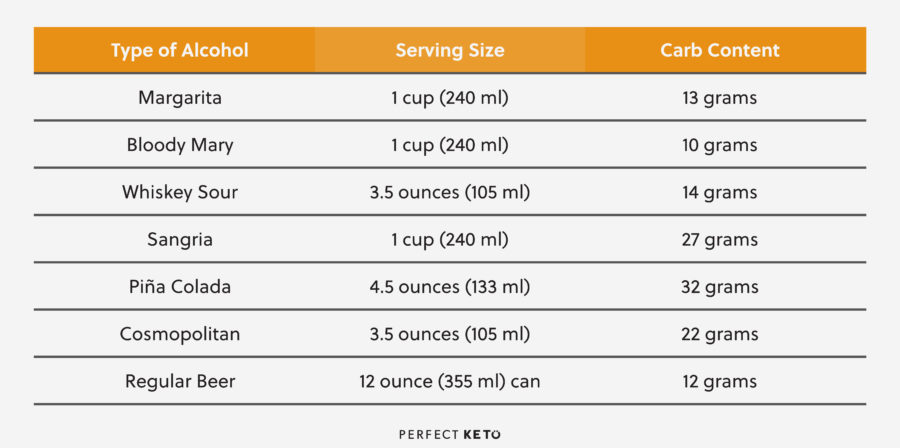
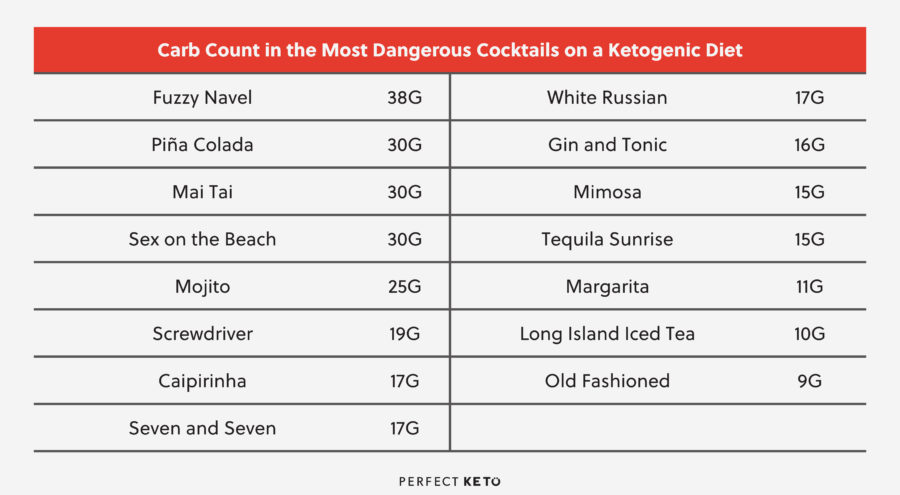 While you have plenty of keto alcohol options, there are also drinks you’ll want to avoid on a low-carb diet.
While you have plenty of keto alcohol options, there are also drinks you’ll want to avoid on a low-carb diet.
- Margarita
- Pina colada
- Sangria
- Negroni
- Old fashioned
- Rum and Coke
- Cosmopolitan
- Bloody Mary
- Whiskey sour
- Regular beer
- Non-dry wines
- Wine coolers
These options are all higher in carbs, and you’re better off avoiding them.
Keto Alcohol Guidelines
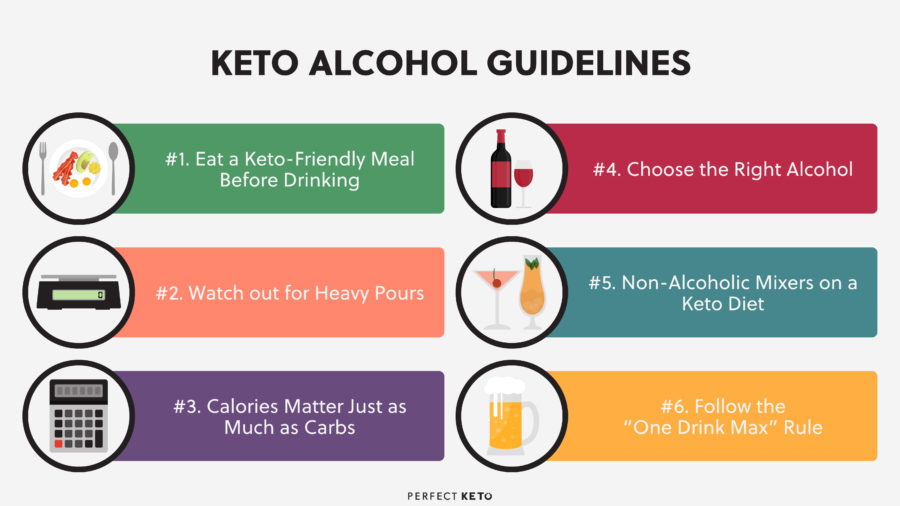
If you’re going to drink alcohol while on a keto diet, be smart about it, and plan to take extra precautions. Here are six ways you can stay in ketosis and enjoy a night out on the town.
#1. Eat a Keto-Friendly Meal Before Drinking
Carb-loading before a night of drinking is not your best option. When you eat a carb-heavy meal before drinking, you kick yourself out of ketosis and jeopardize how your body metabolizes the alcohol.
Fat and protein are your friends before a couple of keto-friendly drinks. This powerful combination helps slow the effects of alcohol, so it delivers less of a metabolic strike to your system. Check out the keto recipe section to find a great high-fat, low-carb meal to start your night out the right way.
#2. Watch out for Heavy Pours
At the bar, it can be nearly impossible to know if your whiskey-based cocktail or champagne spritzer is mixed to keto-friendly proportions.
Unless you can watch the bartender make your drink or know the weight of the wine in different glasses, it’s difficult to know if your serving truly is within your macros.
If you enjoy alcoholic beverages at home, you can monitor your alcohol portions. Develop a habit of measuring the alcohol with a digital food scale as you pour it to keep your portion sizes in check[*].
Do this enough, and you’ll be able to gauge whether that glass of white wine at your favorite restaurant came with a heavy pour. If it does, adjust the rest of your macros and account for it in your meal plan.
#3. Calories Matter Just as Much as Carbs
On a keto diet, counting net carbs is more critical than counting calories, but alcohol is the exception to the rule. Alcohol contains 100 percent empty calories. With just a few beverages, you can easily drink a meal’s worth of calories without realizing you’re over your limit.
Repeat this too often, and your weight may start tipping in the wrong direction. Familiarize yourself with low-carb, low-calorie options, and stick to them.
Possible Downsides To Alcohol On a Keto Diet
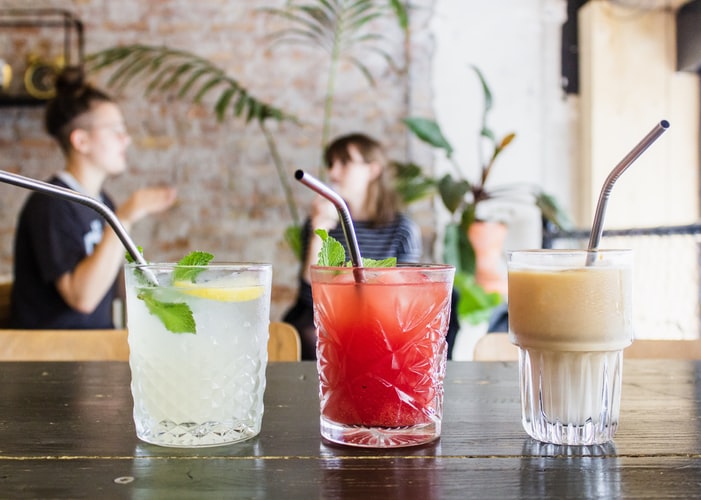
You can certainly drink some types of alcohol on a ketogenic, low-carb diet without guilt. But there are reasons why drinking alcohol can potentially sabotage your goals.
You’re More Likely to Crave High-Carb Foods
Alcohol is packed with empty calories. The calories you get from alcohol — 7.1 per gram to be exact — offer no nutritional value[*].
You won’t feel full, and you’ll be more likely to overeat unhealthy foods since your inhibitions are lowered. This can make your stomach seem like a bottomless pit, scrounging for more calories as soon as you finish your first drink.
Also, you’ll imbibe a large number of calories getting there. Alcohol has double the number of calories per gram as protein, though it does nothing to improve your body. So, if you’re following a very strict daily calorie intake to create a deficit and lose weight, alcohol will eat a large portion of this allotment for zero benefits.
For the same amount of calories, you could give your body something much healthier, like a serving of avocado or a collagen protein smoothie. Those foods will keep you in fat-burning mode, whereas alcohol will temporarily shut that process down.
You Impair Your Body’s Ability to Burn Fat for Fuel
Your body treats alcohol as a toxic substance. When it enters your bloodstream, your body shifts gears and focuses all of its energy on processing the alcohol out of your system.
Everything else hits the pause button to take care of the alcohol, including digesting the high-carb foods you may have eaten in preparation. When this happens, your body stores that excess energy of sugar and carbs as fat[*].
Since your body is busy filtering out alcohol, it also stops using fat for energy like it normally does when you are in ketosis. Rather than breaking down fatty acids to create ketones for energy, your body uses the empty calories you drank for fuel. This won’t help you reach or maintain ketosis — it has the opposite effect.
If you’ve been struggling to reach ketosis, start by reducing or eliminating your alcohol intake. This will prevent fat storage and keep ketone production strong, so fat loss becomes more likely.
If you can avoid succumbing to high-calorie cravings, and you don’t plan to drink enough to kick yourself out of ketosis, there’s one more aspect to consider before you order that drink.
You’ll Get Drunk Faster, and Your Hangover May Be Worse
Whether you have a glass of red wine or two with your friends after work or plan to drink beer through 18 holes of golf on the weekend, a keto diet alters the effects of alcohol on your body.
When you’re in ketosis, alcohol hits your system faster and stronger than it did when your body was housing more carbohydrates. Your alcohol tolerance plummets to almost zero when you’re in ketosis, because your glycogen stores are depleted.
Typically, people have plenty of glycogen stored in their bodies, thanks to carb-heavy diets which serve as a cushion for metabolizing alcohol. Without this buffer, your body processes alcohol much faster, and you’ll feel the effects sooner.
In addition to your new lower tolerance, those on a ketogenic diet also report harsher hangovers than when they ate a high-carb diet. While there aren’t definitive studies proving why this happens, dehydration and an imbalance of electrolytes seem to play a part.
Both dehydration and electrolyte imbalance can occur when you drink alcohol and when you’re in ketosis, creating the perfect storm for intense hangovers. However, you can minimize the downsides of drinking alcoholic beverages on a ketogenic diet.
Save This Keto Alcohol Cheat Sheet
Now that you have a better idea of how alcoholic beverages affect you in ketosis and know which low-carb alcohol choices are better than others, you can decide whether alcohol consumption even has a place in your meal plan.
If you’re new to the keto lifestyle or haven’t reached ketosis yet, consider taking a break from alcohol to help you get there. If you decide to imbibe, take it easy. Your keto alcohol tolerance will be much lower once you’re in ketosis.
For seasoned keto veterans — you should have no trouble sipping your favorite adult beverages, provided you account for the carbs in your daily macro budget. A friendly reminder: Don’t consume too many drinks each week or in one sitting. Always have a designated driver and practice responsible, safe drinking.
